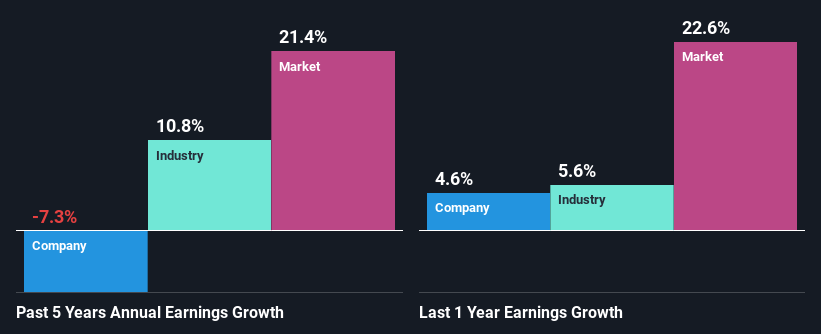ICICI Prudential Life Insurance Company Limited's (NSE:ICICIPRULI) Has Performed Well But Fundamentals Look Varied: Is There A Clear Direction For The Stock?

Most readers would already know that ICICI Prudential Life Insurance's (NSE:ICICIPRULI) stock increased by 4.4% over the past three months. However, we decided to study the company's mixed-bag of fundamentals to assess what this could mean for future share prices, as stock prices tend to be aligned with a company's long-term financial performance. Particularly, we will be paying attention to ICICI Prudential Life Insurance's ROE today.
ROE or return on equity is a useful tool to assess how effectively a company can generate returns on the investment it received from its shareholders. In short, ROE shows the profit each dollar generates with respect to its shareholder investments.
Check out our latest analysis for ICICI Prudential Life Insurance
How To Calculate Return On Equity?
ROE can be calculated by using the formula:
Return on Equity = Net Profit (from continuing operations) ÷ Shareholders' Equity
So, based on the above formula, the ROE for ICICI Prudential Life Insurance is:
7.7% = ₹8.5b ÷ ₹110b (Based on the trailing twelve months to March 2024).
The 'return' refers to a company's earnings over the last year. One way to conceptualize this is that for each ₹1 of shareholders' capital it has, the company made ₹0.08 in profit.
What Is The Relationship Between ROE And Earnings Growth?
We have already established that ROE serves as an efficient profit-generating gauge for a company's future earnings. We now need to evaluate how much profit the company reinvests or "retains" for future growth which then gives us an idea about the growth potential of the company. Assuming everything else remains unchanged, the higher the ROE and profit retention, the higher the growth rate of a company compared to companies that don't necessarily bear these characteristics.
ICICI Prudential Life Insurance's Earnings Growth And 7.7% ROE
It is hard to argue that ICICI Prudential Life Insurance's ROE is much good in and of itself. Even when compared to the industry average of 9.9%, the ROE figure is pretty disappointing. Given the circumstances, the significant decline in net income by 7.3% seen by ICICI Prudential Life Insurance over the last five years is not surprising. We believe that there also might be other aspects that are negatively influencing the company's earnings prospects. For instance, the company has a very high payout ratio, or is faced with competitive pressures.
That being said, we compared ICICI Prudential Life Insurance's performance with the industry and were concerned when we found that while the company has shrunk its earnings, the industry has grown its earnings at a rate of 11% in the same 5-year period.

Earnings growth is an important metric to consider when valuing a stock. What investors need to determine next is if the expected earnings growth, or the lack of it, is already built into the share price. Doing so will help them establish if the stock's future looks promising or ominous. Is ICICI Prudential Life Insurance fairly valued compared to other companies? These 3 valuation measures might help you decide.
Is ICICI Prudential Life Insurance Using Its Retained Earnings Effectively?
When we piece together ICICI Prudential Life Insurance's low three-year median payout ratio of 10% (where it is retaining 90% of its profits), calculated for the last three-year period, we are puzzled by the lack of growth. The low payout should mean that the company is retaining most of its earnings and consequently, should see some growth. So there might be other factors at play here which could potentially be hampering growth. For instance, the business has faced some headwinds.
Moreover, ICICI Prudential Life Insurance has been paying dividends for eight years, which is a considerable amount of time, suggesting that management must have perceived that the shareholders prefer consistent dividends even though earnings have been shrinking. Our latest analyst data shows that the future payout ratio of the company is expected to rise to 18% over the next three years. Still, forecasts suggest that ICICI Prudential Life Insurance's future ROE will rise to 13% even though the the company's payout ratio is expected to rise. We presume that there could some other characteristics of the business that could be driving the anticipated growth in the company's ROE.
Conclusion
Overall, we have mixed feelings about ICICI Prudential Life Insurance. Even though it appears to be retaining most of its profits, given the low ROE, investors may not be benefitting from all that reinvestment after all. The low earnings growth suggests our theory correct. With that said, we studied the latest analyst forecasts and found that while the company has shrunk its earnings in the past, analysts expect its earnings to grow in the future. To know more about the company's future earnings growth forecasts take a look at this free report on analyst forecasts for the company to find out more.
New: AI Stock Screener & Alerts
Our new AI Stock Screener scans the market every day to uncover opportunities.
• Dividend Powerhouses (3%+ Yield)
• Undervalued Small Caps with Insider Buying
• High growth Tech and AI Companies
Or build your own from over 50 metrics.
Have feedback on this article? Concerned about the content? Get in touch with us directly. Alternatively, email editorial-team (at) simplywallst.com.
This article by Simply Wall St is general in nature. We provide commentary based on historical data and analyst forecasts only using an unbiased methodology and our articles are not intended to be financial advice. It does not constitute a recommendation to buy or sell any stock, and does not take account of your objectives, or your financial situation. We aim to bring you long-term focused analysis driven by fundamental data. Note that our analysis may not factor in the latest price-sensitive company announcements or qualitative material. Simply Wall St has no position in any stocks mentioned.
About NSEI:ICICIPRULI
ICICI Prudential Life Insurance
Provides life insurance, pension, and health insurance products to individuals and groups in India.
Mediocre balance sheet with limited growth.
Similar Companies
Market Insights
Community Narratives




